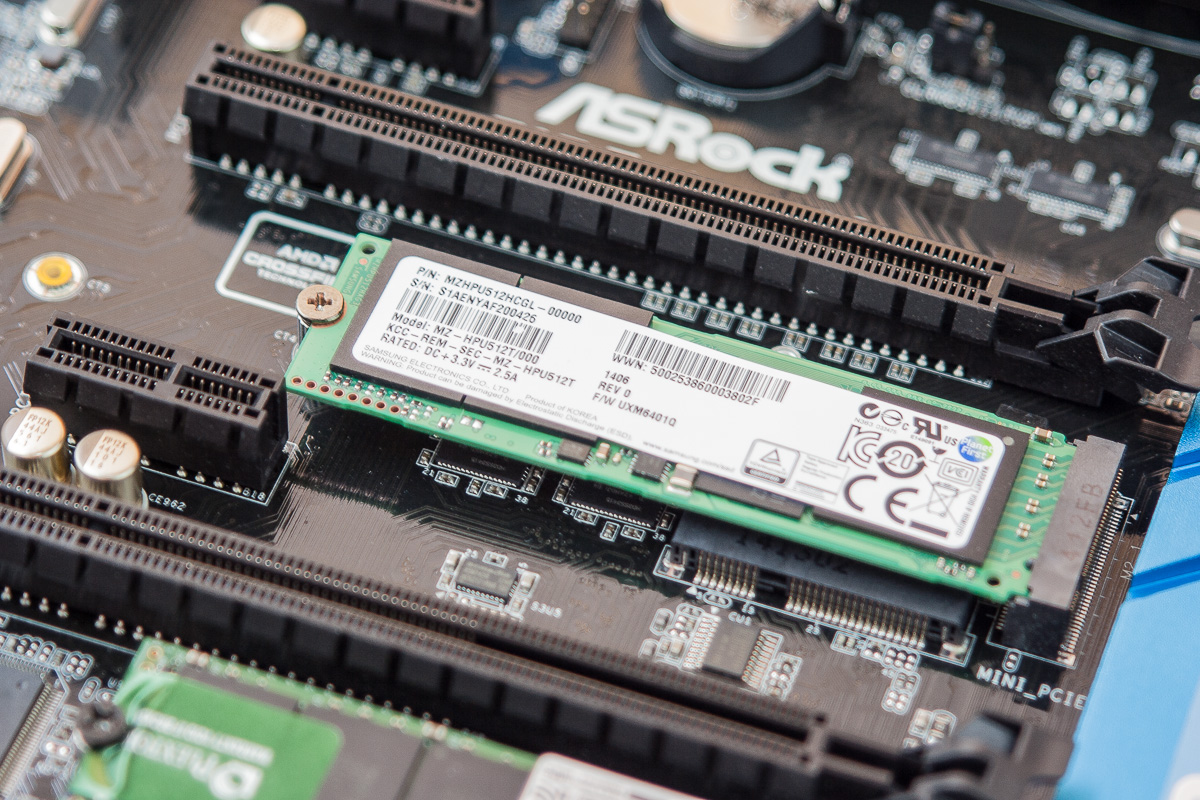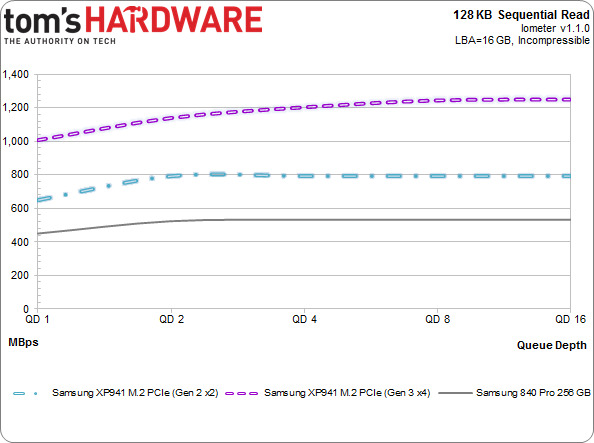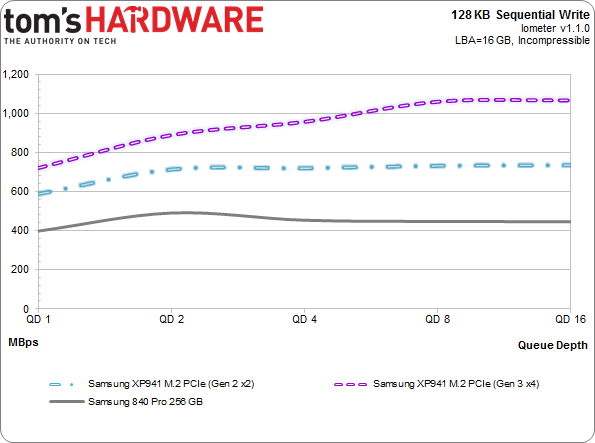A 1400 MB/s SSD: ASRock's Z97 Extreme6 And Samsung's XP941
Z97 ushers in new and exciting ways to attach and use storage devices. With support for M.2 PCIe and SATA Express, two sides of the same SSD coin, Z97 improves on Z87. But not everywhere. AsRock add to Z97 with some new tricks, and so we take a look.
Results: A PCIe SSD's Sequential Performance
Samsung's 512 GB XP941 is the first four-lane PCI Express M.2 drive in our lab, and we want to know how it performs. In order to figure out what the SSD is capable of, we'll mix up some of the tests from our other storage reviews. First, we benchmark it in ASRock's Ultra slot, which won't limit the device's peak throughput. Then we compare those results to the PCH-attached M.2 slot, which I expect will artificially cap its potential.
Sequential reads and writes are most likely to illustrate my point, so we start there.
Sequential Reads
If you read the previous page, then you won't be surprised by an outcome of 1250 MiB/s in the M.2 slot attached to our Haswell-based Core i5-4670K. A conversion to decimal lands us right around 1.4 GB/s.
Swap the drive over to a PCH-attached M.2 slot, though, and the binary read throughput drops precipitously. Eight-hundred megabytes per second is nothing to sneeze at. But that's still 33% less than the result measured from ASRock's Ultra slot.
Now check out Samsung's otherwise well-reviewed 840 Pro. It looks shabby in comparison, even though we know it to be one of the best SATA 6Gb/s options available. Then again, there's more to the performance story than just sequential throughput.
Sequential Writes
Sequential writes are even more illustrative of the puissant ASRock Z97 Extreme6/Samsung XP941 combo.
And here's why. The 840 Pro gives us almost 450 MB/s of peak bandwidth (again, in binary). Samsung's XP941 in the PCH-attached, two-lane M.2 slot offers a substantial increase, appearing just under 800 MB/s. The SSD should be commended; it can fully exploit a pair of PCI Express lanes, which SanDisk's A110 and Plextor's M6e cannot do.
Get Tom's Hardware's best news and in-depth reviews, straight to your inbox.
Then the XP941 jumps up a notch by peaking in excess of 1000 MB/s when we drop it onto ASRock's CPU-attached Ultra M.2 four-lane slot. That's basically what two of the fastest 6 Gb/s SATA drives achieve in RAID 0.
Current page: Results: A PCIe SSD's Sequential Performance
Prev Page Testing Samsung's XP941 On Z97 Express Next Page Results: A PCIe SSD's Random Performance-
aminebouhafs Once an SSD in plugged into the Ultra M.2 slot, the bandwidth between central processing unit and graphics processing unit is cut-down by half. Therefore, while the end-user gets additional SSD performance, the end-user may lose some GPU performance because of insufficient bandwidth between it and the CPU.Reply -
JoeArchitect Very interesting article and a great read. Thanks, Chris - I hope to see more like this soon!Reply -
Eggz This makes me excited for X99! With 40 (or more) lanes, of PCI-e (probably more), there will be no need to compromise. We have to remember that the Z97 Chipset is a consumer-grade product, so there almost has to be tradoffs in order to justify stepping up to a high-end platform.Reply
That said, I feel like X99, NVMe, and and M.2 products will coincide nicely with their respective releases dates. Another interesting piece to the puzzle will be DDR4. Will the new storage technology and next-generation CPUs utilize it's speed, or like DD3, will it take several generations for other technologies to catch up to RAM speeds? This is quite an interesting time :) -
Amdlova Chris test the asrock z97 itx... and another thing... my last 3 motherboard from asrock and i want to say Asrock Rock's!Reply -
Damn_Rookie While storage isn't the most important area of computer hardware for me, I always enjoy reading Christopher's articles. Very well written, detail orientated, and above all else, interesting. Thanks!Reply -
hotwire_downunder ASRock has come along way, I used them a long time back with disappointing results, but I have started to use them again and have not been disappointed this time around.Reply
Way to turn things around ASRock! Cheap as chips and rock steady! -
alidan @aminebouhafs if i remember right, didn't toms show how much performance loss there is when you tape gpu cards to emulate having half or even a quarter of the bandwidth? if i remember right back than the difference was only about 12% from 16 lanes down to either 4 or 8Reply -
Eggz Reply13445787 said:@aminebouhafs if i remember right, didn't toms show how much performance loss there is when you tape gpu cards to emulate having half or even a quarter of the bandwidth? if i remember right back than the difference was only about 12% from 16 lanes down to either 4 or 8
PCI-e 3.0 x8 has enough bandwidth for any single card. The only downside to using PCI-e lanes on the SSD applies only to people who want to use multiple GPUs.
Still, though, this is just the mid-range platform anyway. People looking for lots of expansion end up buying the X chipsets rather than the Z chipsets because of the greater expandability. I feel like the complaint is really misplaced for Z chipsets, since they only have 16 PCI-e lanes to begin with. -
cryan ReplyOnce an SSD in plugged into the Ultra M.2 slot, the bandwidth between central processing unit and graphics processing unit is cut-down by half. Therefore, while the end-user gets additional SSD performance, the end-user may lose some GPU performance because of insufficient bandwidth between it and the CPU.
Well, it'll definitely negate some GPU configurations, same as any PCIe add-in over the CPU's lanes. With so few lanes to work with on Intel's mainstream platforms, butting heads is inevitable.
Regards,
Christopher Ryan


